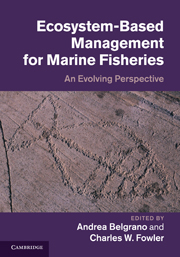Foreword
Published online by Cambridge University Press: 17 February 2011
Summary
The necessity of an ecosystem approach (EA) to fishery management has been gaining worldwide recognition in recent years. This concept provides an attractive alternative to viewing fisheries mainly as a profit-oriented economic enterprise, especially given a growing dissatisfaction with a long, mixed, and in some cases dismal record of resource overfishing, depletion, and collapse. Though it is intuitively appealing, the EA concept has been rather difficult to define formally. Yet, something called “an ecosystem approach” is now being attempted in many different fisheries systems – collectively characterized with as much variety as common ground. There are yet more proposals for how to implement an EA waiting to be put into practice. The diverse collection of examples in this book provides an overview of EA both in current practice and future potential, and may contribute a subjective sense of what EA actually is, whether or not we attempt a definition.
Part of the difficulty in defining EA is that it reflects a set (or sets) of values, and human values notoriously elude formal definition. Such plausible concepts as “ecosystem health” are value-based, and it may be a false assumption that they can be measured and defined objectively. However, once the subjective terms of reference for EA have been established, some degree of conditional objectivity may become possible.
Man is the only creature that frequently takes action based on an abstract, imagined, and even probabilistic future.
- Type
- Chapter
- Information
- Ecosystem Based Management for Marine FisheriesAn Evolving Perspective, pp. xiii - xviPublisher: Cambridge University PressPrint publication year: 2011



